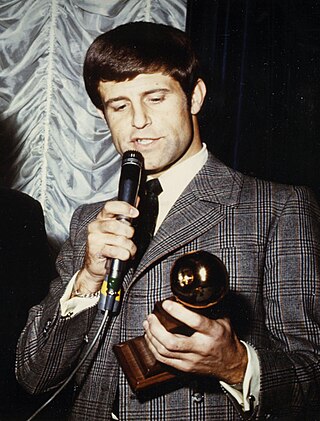
The fifth Beatle is an informal title that has been applied to people who were at one point a member of the Beatles or who had a strong association with John Lennon, Paul McCartney, George Harrison, and Ringo Starr.

A record label or record company is a brand or trademark of music recordings and music videos, or the company that owns it. Sometimes, a record label is also a publishing company that manages such brands and trademarks, coordinates the production, manufacture, distribution, marketing, promotion, and enforcement of copyright for sound recordings and music videos, while also conducting talent scouting and development of new artists, artist financing and maintaining contracts with recording artists and their managers. The term "record label" derives from the circular label in the center of a vinyl record which prominently displays the manufacturer's name, along with other information.

A press kit, often referred to as a media kit in business environments, is a pre-packaged set of promotional materials that provide information about a person, company, organization or cause and which is distributed to members of the media for promotional use. Press kits are often distributed to announce a release or for a news conference.
Artists and repertoire is the division of a record label or music publishing company that is responsible for scouting, financing and overseeing the artistic development of recording artists and songwriters. It also acts as a liaison between artists and the record label or publishing company. Every activity involving artists to the point of album release is generally considered under the purview and responsibility of A&R.

Steve "Renman" Rennie is an American talent manager and entrepreneur. He is the founder of RENManagement and RenmanMB, a platform that offers industry guidance for musicians.

The music industry refers to the individuals and organizations that earn money by writing songs and musical compositions, creating and selling recorded music and sheet music, presenting concerts, as well as the organizations that aid, train, represent and supply music creators. Among the many individuals and organizations that operate in the industry are: the songwriters and composers who write songs and musical compositions; the singers, musicians, conductors, and bandleaders who perform the music; the record labels, music publishers, recording studios, music producers, audio engineers, retail and digital music stores, and performance rights organizations who create and sell recorded music and sheet music; and the booking agents, promoters, music venues, road crew, and audio engineers who help organize and sell concerts.
A modeling agency is a company that represents fashion models, to work for the fashion industry. These agencies earn their income via commission, usually from the deal they make with the model and/or the head agency.
A talent agent, or booking agent, is a person who finds work for actors, authors, broadcast journalists, film directors, musicians, models, professional athletes, screenwriters, writers, and other professionals in various entertainment or sports businesses. In addition, an agent defends, supports and promotes the interest of their clients. Talent agencies specialize, either by creating departments within the agency or developing entire agencies that primarily or wholly represent one specialty. For example, there are modeling agencies, commercial talent agencies, literary agencies, voice-over agencies, broadcast journalist agencies, sports agencies, music agencies and many more.
Tour promoters are the individuals or companies responsible for organizing a live concert tour or special event performance. The tour promoter makes an offer of engagement to a particular artist, usually through the artist's agent or music manager. The promoter and agent then negotiate the live performance contract. The majority of live performance contracts are drawn up using the American Federation of Musicians (AFM) standard contract format known as the AFM Performance Agreement.
Terry Ellis is an English record producer and manager who worked with the early Jethro Tull band, and as co-founder of music company Chrysalis Records in 1969.

Bhaskar Menon was a music industry executive of Indian origin. He hailed from Palakkad, Kerala, India. He initially worked with The Gramophone Company of India Ltd. (HMV) Dum Dum, Calcutta, India as the chairman and MD. From there he was taken to the United Kingdom by EMI.
Berle Adams was an American music industry executive and talent booking agent best known for co-founding Mercury Records in the 1940s and later becoming a senior executive at MCA.
Tony Calder was an English record manager, impresario, talent-spotter, promoter and public relations agent. He was Andrew Loog Oldham's business partner from 1963 to December 1969.
Direct-to-fan is a business model used by independent musicians, independent music labels, music marketing professionals, promoters, and others in the music industry. Direct-to-fan is also becoming a model used by the broad definition of artists, including comedians, visual artists, and other entertainers looking to build and leverage a fan community throughout their career.

Don Grierson was a British-born music industry executive best known for receiving the Golden Apple Award from the Beatles and signing Celine Dion to her first US recording contract.

The album era was a period in popular music during the latter half of the 20th century in which the album—a collection of songs issued on physical media—was the dominant form of recorded music expression and consumption. Usually defined as lasting from the mid-1960s until the mid-2000s, it was driven primarily by three successive music recording formats: the 33⅓ rpm long-playing record (LP), the cassette tape, and the compact disc (CD). Rock musicians from the US and UK were often at the forefront of the era. The term "album era" is also used to refer to the marketing and aesthetic period surrounding a recording artist's release of an album.

Philip Michael Quartararo was an American music industry executive. He was the president and chairman of The Hello Group, and held positions as CEO at Virgin Records, Warner Bros. Records, and EMI, and was involved in the careers of recording artists such as Linkin Park, Josh Groban, Spice Girls, U2, and Yoshiki. Quartararo was known as a defender of artist rights. He spoke out on the fight against music piracy and restoring the value of music. Quartararo was regarded as one of the most promotion-minded executives in the music business and was regarded as a thought leader on the subject of partnership between brands and artists.
Mike Kappus is an American music manager and record producer.

Jake Udell is an American music manager, entrepreneur, founder of TH3RD BRAIN, former head of activation at Community.com, and founder of Metalink Labs. At the EDMbiz conference in Las Vegas in June 2014, Udell moderated a panel featuring panelists in the industry under the age of 30. After viewing the panel, music industry analyst Bob Lefsetz included an excerpt about Udell in his newsletter, "Jake is a new Shep Gordon, maybe a new Irving or Geffen." Udell was featured in Forbes 2016 30 Under 30 list in the Music category, and was listed as one of Billboard's 40 Under 40 in 2017.

Record sales or music sales are activities related to selling music recordings through physical record shops or digital music stores. Record sales reached their peak in 1999, when 600 million people spent an average of $64 on records, achieving $40 billion in sales of recorded music. Sales continued declining in the 21st century. The collapse of record sales also made artists rely on touring for most of their income. By 2019, record sales accounted for less than half of global recorded music revenue, overtaken by streaming. Following the inclusion of streaming into record charts in the mid-2010s, record sales are also referred to as traditional sales or pure sales.











